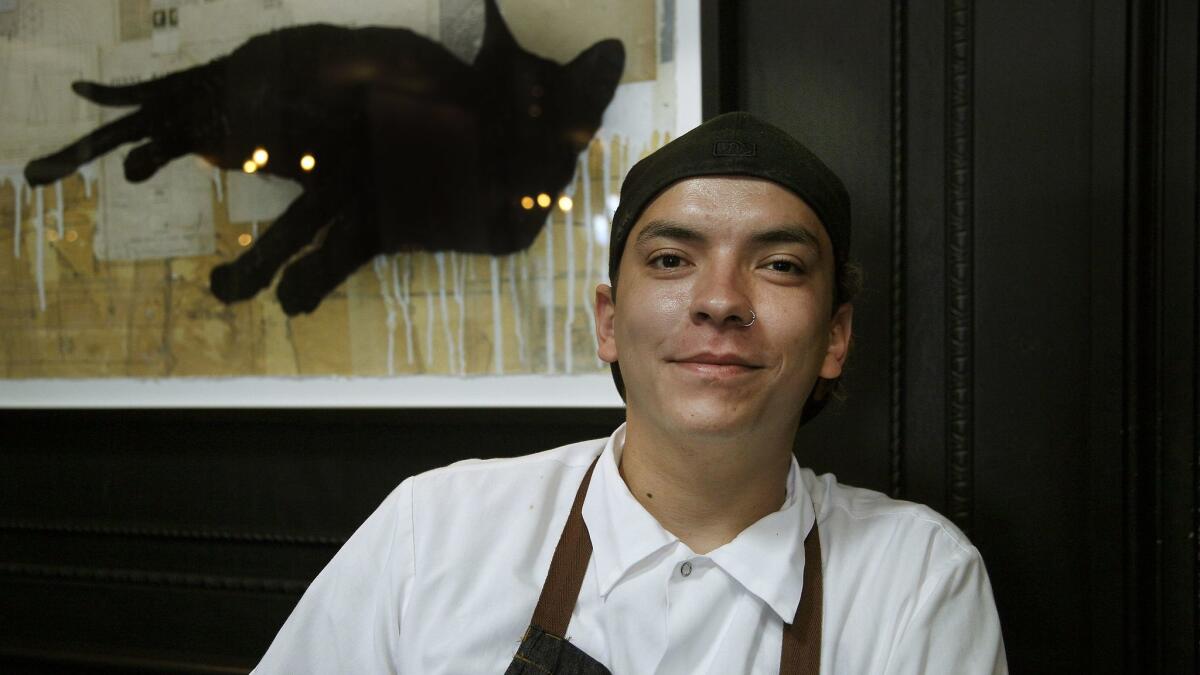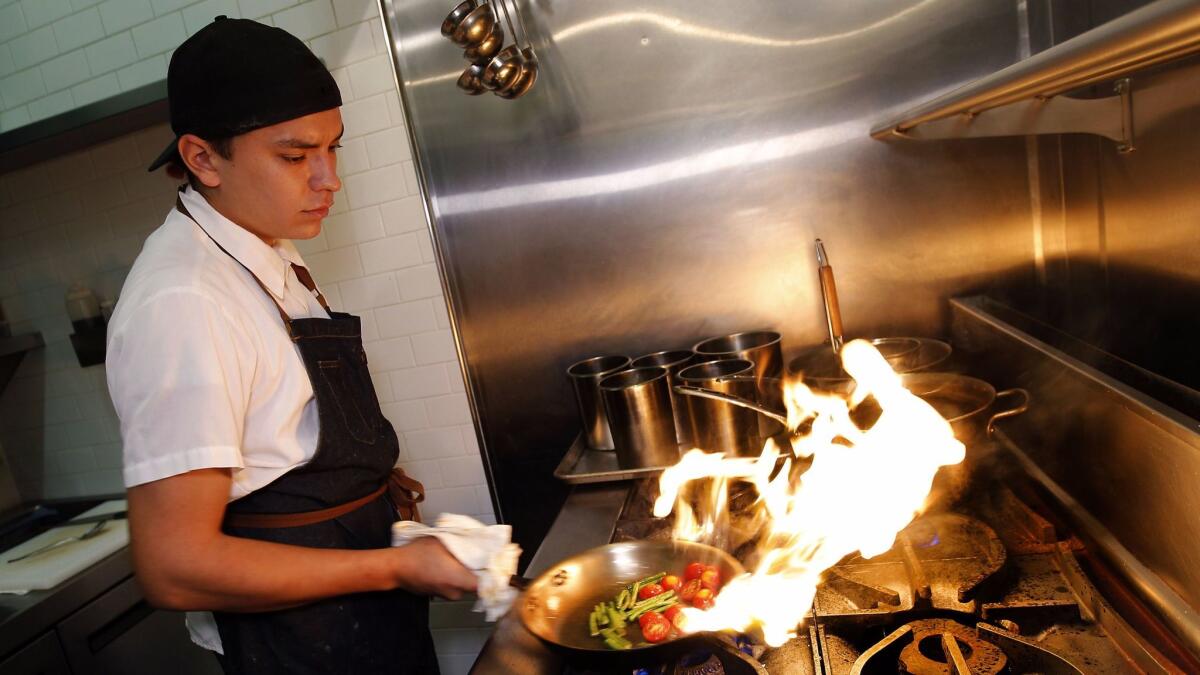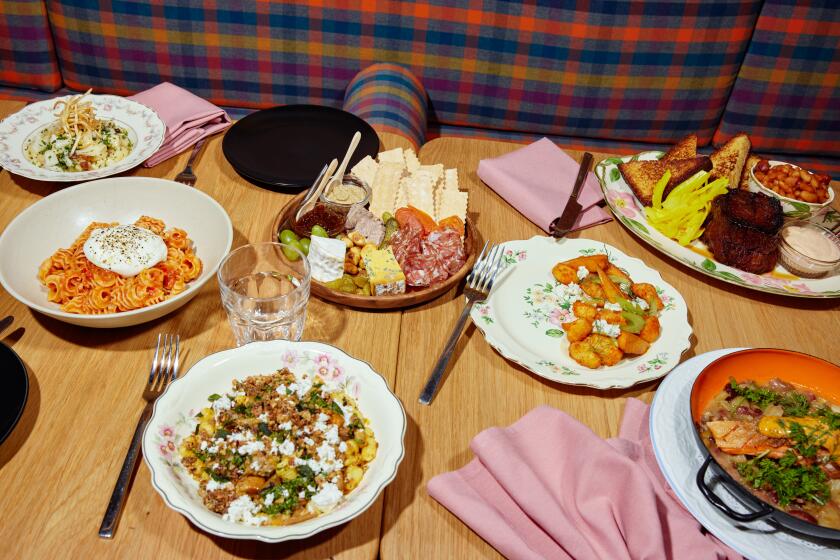How being homeless didn’t change this Los Angeles cook’s dream

- Share via
“If you need help, work harder.” This is what Lance Thomas remembers a chef mentor telling him one night six years ago, when they were both in the weeds, cooking slang for being slammed in a busy restaurant kitchen. It’s a piece of advice that has helped Thomas, now 25, get through both the good times and the bad times — including being homeless.
Thomas has worked in the restaurant industry since he was 15, when he landed a job as a fry cook at a Wendy’s in Alhambra. “I knew then that I was going to cook for the rest of my life,” Thomas says now. “I would even ditch school to work because I loved it so much.”
Easygoing and quick to joke, his bleach-tipped black hair often tucked into a trim cap, Thomas grew up first with his grandmother in the Boyle Heights neighborhood of Los Angeles, then with his aunt in the San Gabriel Valley — but always with the Food Network. (Favorite: Giada De Laurentiis.)
Including that initial job at Wendy’s, Thomas estimates that he’s worked in 25 kitchens in and around Los Angeles in the last decade, including stints at Clifton’s, Little Sister, Cook’s County and Bottega Louie. It’s a turnover that’s not unusual for those who make up the unglamorous back-of-house side of restaurants, where even a 25-cent difference in hourly rate is enough to leave one job for another.
In January, Thomas found what he hopes is a longer home, at the Black Cat, a gastropub in Silver Lake, where he’s recently been promoted to a junior sous-chef position.
Over the years, Thomas has moved through pretty much every station in a kitchen, from deep-frying to making salads. He’s come to specialize in the sauté position because, he says, “it’s the one that gets hit the hardest, and I love the challenge.”

A few months ago, Thomas met one challenge that he didn’t see coming, and that has been a lot harder than any busy restaurant: He found himself without a bed to come home to at night — much less a kitchen.
It’s a story that’s becoming too familiar to too many people like Thomas, someone with a job and a young family. Thomas — whose longtime girlfriend, Ivette Saucedo, has a 7-year-old daughter, Alaia — had bad credit, not enough money, and the relatives who had once housed him were no longer willing or able to do so.
“I didn’t know what was going wrong,” says Thomas. “Was it me? Was it the economy? It just didn’t make sense because I’d always had a place to live.”
So he did what he’d always done in restaurants: He kept his head down, showed up to work earlier, stayed later and worked harder.
Meanwhile, Thomas and his family shuttled among a network of friends’ beds, couches, even floors. Saucedo says that Thomas had a kind of barter system going, when he could, cooking for his friends in return for their hospitality. When Thomas couldn’t cook, he and Saucedo would rely on fast-food dollar menus and two-for-one tacos from the stands in East L.A. and Boyle Heights.
(Thomas is likely not the first line cook who’s had to sleep on friends’ floors . A study released by the National Low Income Housing Coalition in June showed that nowhere in America can an employee working a minimum wage job afford to rent a two-bedroom apartment. It’s particularly bad in Los Angeles, which currently has the fourth-worst rental market in the United States, according to a March report by Forbes.)
Was it me? Was it the economy? It just didn’t make sense because I’d always had a place to live.
— Lance Thomas

Thomas credits what he learned in restaurant kitchens with helping him get through the tougher times.
“When you’re cooking, you don’t have time to think about how down in the dumps you are or what’s happening in your personal life, you just have to cook and make it all taste great — no matter what,” Thomas says. “I just focused on going back to work every day.”
“It is very hard to to find a good line cook like Lance nowadays,” says Trevor Rocco, the Black Cat’s executive chef, who first met Thomas four years ago, when they both cooked at Cook’s County, the late farm-to-table restaurant on Beverly Boulevard.
“Anybody can be taught to cook, but it’s the attitude and character that is also needed for the job that’s the problem,” says Rocco. “This has become really difficult to find because a lot of new cooks are just trying to find the quickest path to become a celebrity chef, or whatever, but aren’t willing to put in the time to know how to properly roast a chicken.”
Shortly after Thomas became homeless, Rocco noticed a difference and asked his cook what was going on. “He opened up to me and told me he didn’t have a place to live,” says Rocco. “I’ve been in that position too, and I know what that’s like. If worse came to worse, he could always crash at my couch.” Rocco found Thomas a temporary place to stay and made sure Thomas spent two days each week looking for a solid place to live.
“He wanted me to relax and progress, and I feel really grateful,” Thomas says of Rocco, knowing that in many ways he’s been more fortunate than most. He’s kept his job and his family — and he’s recently found an inexpensive apartment in Boyle Heights.
Sharing his new home with a roommate, Saucedo and her daughter, Thomas now begins his days by making breakfast for Alaia — who has also started to take an interest in cooking.
Thomas says being homeless was no excuse for him to not cook. “I always had a kitchen. If not at the restaurant, at a homie’s pad making pozole for family or on a hot plate in the street. There is always a way to cook.”
ALSO
The Taste food event returns to Paramount Studios Labor Day weekend
The guy who brought you Umami Burger wants to reinvent PB&J
Q&A: Talking with John T. Edge about Southern food, in and out of L.A.
More to Read
Eat your way across L.A.
Get our weekly Tasting Notes newsletter for reviews, news and more.
You may occasionally receive promotional content from the Los Angeles Times.










